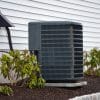Forced Air Furnaces and heat pumps are both heating systems used to provide warmth to a building, but they operate differently and have some key differences:

1. Operation
Heat Pumps
Heat pumps operate on the principle of transferring heat, leveraging a refrigerant to extract warmth from the outdoor air and transferring it inside. This process is not only efficient but also reversible, allowing heat pumps to offer cooling during warmer months. Advanced models often include variable-speed compressors, enhancing efficiency and providing precise temperature control. The benefits of heat pumps extend to their sustainable nature, moving existing heat and making them an eco-friendly choice.
Furnaces
In contrast, furnaces generate heat by burning fuel, typically natural gas or propane, within a combustion chamber. The produced heat is then distributed throughout the home via a duct system. Furnaces are known for their quick and efficient heating, making them ideal for colder climates where rapid temperature elevation is crucial. High-efficiency furnaces incorporate features like variable-speed blowers, optimizing energy usage and maintaining consistent comfort. The benefits of furnaces, such as fast and reliable heating, are essential considerations when determining the ideal heating system for your home.
2. Efficiency
Heat Pumps
Renowned for their energy efficiency, heat pumps operate by moving existing heat, consuming less energy compared to systems that generate heat. The efficiency of a heat pump is influenced by factors such as outdoor temperature, insulation levels, and proper system sizing. Technological advancements, including variable-speed compressors and smart thermostats, contribute to optimizing overall efficiency. Selecting the right-sized heat pump ensures optimal performance and energy savings, emphasizing the benefits of energy efficiency for homeowners.
Furnaces
High heating efficiency is a hallmark of furnaces, especially in extremely cold climates. Like the heat pump, efficiency can be influenced by factors such as insulation quality, ductwork condition, but also, the type of fuel used. High-efficiency furnaces, often identified by their Annual Fuel Utilization Efficiency (AFUE) rating, significantly reduce operational costs over time. Regular maintenance, including cleaning and filter replacement, ensures consistent efficiency. Evaluating the benefits of furnace efficiency guides decision-making, emphasizing long-term cost savings.

3. Climate Suitability
Heat Pumps
Excel in moderate climates, efficiently extracting heat from the air is particularly effective in regions with milder winters. In extremely cold climates, supplementary heating sources may be needed. Choosing a heat pump with a lower temperature rating enhances performance in colder conditions Utilizing the constant temperature of the earth, provides consistent efficiency across diverse climates. Assessing climate suitability helps homeowners determine if a heat pump is the right fit for their specific environment.
Furnaces
Well-suited for colder climates, furnaces provide reliable warmth even in sub-zero temperatures. Their ability to quickly heat a space makes them suitable for regions with harsh winters. High-efficiency furnaces, equipped with features like variable-speed blowers, adapt to varying climate conditions. Investing in a modulating furnace allows for precise adjustments to match heating requirements, ensuring efficient performance in changing weather conditions. Considering the benefits of reliability and adaptability guides homeowners in choosing the right heating system for their climate.
4. Environmental Impact

Heat Pumps
Considered more environmentally friendly, heat pumps produce lower carbon emissions compared to traditional fossil fuel-based heating systems. As the electricity grid becomes greener through increased reliance on renewable energy sources, the environmental benefits of heat pumps continue to rise. Regular maintenance sustains the environmental efficiency of heat pump systems, contributing to an eco-conscious choice for homeowners.
Furnaces
Furnaces, especially those powered by fossil fuels, contribute to carbon emissions and environmental impact. However, adopting high-efficiency furnaces, regular maintenance, and choosing cleaner fuel options can help mitigate their ecological footprint. Exploring alternative fuels, such as biofuels or hydrogen, can further reduce the environmental impact of furnace-based heating systems. Investing in a condensing furnace, which captures and utilizes waste heat, contributes to environmental sustainability by maximizing fuel efficiency. Understanding the benefits of environmental considerations aids in making an informed decision aligned with eco-friendly goals.
5. Initial Cost
Heat Pumps
Keep in mind, in order for your heat pump to work, you’ll also need an air handler accompanied by a heat strip. The air handler and heat strip are essential for a heat pump’s performance, distributing heated or cooled air for comfort. Effectively, the air handler and heat strip are what replaces the furnace in your heating system. Their efficient operation is crucial for energy savings and comfort. While they add to the initial cost of a heat pump system, the long-term benefits justify the investment. Government incentives may also help offset expenses, making it a wise choice for homeowners seeking efficient heating and cooling solutions.
Furnaces
Installation costs for furnaces are often lower compared to heat pumps. The initial investment includes the furnace unit, ductwork installation, and any necessary components. The ongoing expenses involve fuel costs, which can fluctuate with market prices. Choosing a high-efficiency furnace may have a slightly higher upfront cost but can result in substantial long-term savings through reduced energy consumption. Exploring financing options and available rebates can aid in minimizing the initial financial impact of furnace installation, making it an attractive option for homeowners prioritizing cost-effectiveness.
Conclusion
The choice between a furnace and a heat pump depends on various factors, including climate, energy costs, environmental concerns, and your specific heating and cooling needs. Some homeowners even opt for hybrid systems that combine both a furnace and a heat pump to maximize efficiency and performance.


